Sensitivity and the Meaning of Education
An adjunct professor foolish enough to teach an art class at a totalitarian reeducation camp in Minnesota (aka Hamline University) showed a medieval painting depicting Muhammad, after having directly advised students in the course syllabus and during the semester that this painting would be shown and discussed in her online lecture, and offering an opportunity for any students who might be inclined to take offense at this painting, for religious reasons, to exempt themselves from that class. Nevertheless, a Muslim student who chose to enroll in this class, in spite of all the advanced warnings, subsequently used the opportunity to file a formal complaint against the professor’s insensitivity and “disrespect” for her religion (read non-compliance with current progressive demands). The reeducation camp’s overseers then performed their predictable and essential community service of denying the professor’s contract renewal, i.e., punishing her for offending someone who clearly planted herself in that class for no reason other than to “be offended” and to destroy someone’s livelihood for the unpardonable crime of causing a disagreeable feeling.
Thus, the student and the “university” successfully reinforced the proper progressive messaging of our time, namely that offending someone’s sensitivities in any context, by any means, and for any reason, however well-intentioned and respectfully done, is an intolerable act, an expression of hate, and anyone who commits such an act deserves to be treated with the severest intolerance, including but not limited to the absolute denial of her livelihood, her reputation, and any hope of understanding, forgiveness, or reintegration as a human being in good standing.
But wait a moment! Did I just imply that someone might offend another person’s sensitivities in a well-intentioned and respectful way? Yes, I did. But is it possible to offend someone without disrespect, let alone without harm? Yes, it is.
As a matter of fact, such acts of giving offense, which is to say challenging a person’s sensitivities, are of the essence of teaching, just as the condition of having one’s sensitivities challenged (offended) is of the essence of learning. In other words, education, understood in its deepest and most civilizationally essential sense, is all about guiding a soul from its current “comfort zone,” through a period of disorientation and self-doubt, towards a higher level of insight and self-knowledge– and doing this repeatedly and intentionally. Hence the goal of promoting self-development and self-knowledge is almost diametrically opposed to our modern progressive euphemisms such as self-affirmation, self-esteem, and self-definition. For self-knowledge presupposes initial ignorance, and a long, difficult struggle for understanding — a struggle made difficult precisely by the painful, frequent, and necessary transitions through disillusionment and confusion about one’s most dearly held presuppositions and prejudices. By contrast, our modern replacements for the goal of self-knowledge (self-affirmation, self-esteem, self-definition, and the like) foster the notion that “giving offense” — that is, disturbing someone’s comfort — regardless of methods or circumstances, is a violation of the fundamental progressive right never to be challenged, such that having one’s self-certainties tweaked or questioned is now to be understood and experienced as having suffered a hate crime.
In short, true education — and I mean every act of spiritual discovery, formal and informal, at every stage of life — is premised on the ideas that (a) life is a maze of prejudices and comforting but unjustified certitudes, (b) overcoming these is the very meaning of learning, which is to say of maturation, of becoming an actualized adult human being, and (c) given (a) and (b), the most fruitful and therefore developmentally desirable path to knowledge, or even wisdom, begins with actively distinguishing one’s prejudices and certitudes from real understanding, which can only be achieved by testing, examining, and reassessing one’s beliefs by means of open-minded and courageous rational inquiry. Open-minded, because this effort involves looking at one’s assumptions critically and unprotectively, which is most difficult; and courageous, because such an effort will often, if not invariably, cause some genuine spiritual discomfort, i.e., pain. Recognizing that one does not know what one thought one knew, including about matters of the most intimate emotional significance (one’s tastes, moral assumptions, behavioral habits and preferences, loves and hates, indoctrinated faiths and social norms) is one of the most difficult experiences for a human being to face — but also the most developmentally necessary and rewarding.
To reject this essential and ennobling difficulty out of hand, and to do so as a matter of moral principle, no less, is the most delusional and self-destructive distortion of morality that could possibly be conceived — which is why it could only be conceived and preached by progressive nihilism, the most delusional and life-destroying distortion of human nature that the mind of man has ever concocted. Having one’s comfortable beliefs offended, i.e., being dared to doubt or re-examine one’s most reassuring certainties, does indeed poke at one’s most sensitive spots. But to condemn or punish such offense in the name of defending young people’s sensitivities against the threat of being poked at is to declare war against all growth, self-development, learning, and self-awareness. Sensitivity that declares itself king is the mortal enemy of all education, and hence of all serious thought. For education is, at its foundation, nothing but the art of purposefully challenging sensitivities, and learning nothing but the natural propensity to accept and appreciate challenges to one’s sensitivities — which in turn leads to a general reduction of sensitivity, i.e., of defensiveness in the face of alternative ideas or questions, which, in turn, fosters greater civility and mutual respect. Such a goal indicates the essential link between education and a free society; it also indicates, negatively, the reason that factions with a vested interest in fomenting dissent and unrest tend to favor the heightening of sensitivities, along with the impenetrable wall of indignation, built of such oversensitivity, that blocks the path of honest reflection and understanding.
Final note: Certain prominent Muslim organizations have chosen to defend the professor against her quasi-religious condemnation by Hamline University, on the grounds that she intended no harm.
“Although we strongly discourage showing visual depictions of the Prophet, we recognize that professors who analyze ancient paintings for an academic purpose are not the same as Islamophobes who show such images to cause offense,” the national organization [CAIR] said in a statement. “Based on what we know up to this point, we see no evidence that Professor Erika López Prater acted with Islamophobic intent or engaged in conduct that meets our definition of Islamophobia.”
This is supposed to be wonderful news. CAIR has assumed the authority to judge which violations of the modern Muslim prohibition against depictions of Muhammad are forgivable, and which constitute “Islamophobia,” and has used that self-assigned authority — the authority to judge moral intentions and to condemn or forgive intellectual inquiry and public discourse on the basis of such judgment — to bestow leniency for this particular infidel, on this particular occasion, “based on what [they] know up to this point.” Why is this any different from all the religious persecutions and assaults on rational inquiry carried out in the past by the leaders and representatives of other faiths — faiths which happen to be, shall we say, less politically fashionable than Islam within today’s secular progressive religion?
Why, I ask for purely rhetorical purposes, does not a modern American university simply reply to such activist agitator-students, along with any local or national religious, racial, political, or other vested interest organizations, in the following way?
“This is a place of higher learning, an institution dedicated to fostering open rational inquiry and the development of the souls of our students in the direction of reason and the pursuit of knowledge. Those who wish to protect articles of religious faith from being discussed, investigated, or even challenged in a spirit of open inquiry, should be warned that their wishes conflict with the proper aims and methods of university study. No faiths are barred from this place, but none are sacrosanct or beyond the reach of the rational investigation that is the lifeblood of the university, and indispensable to the university’s social function of promoting human nature and fostering liberty by means of the civilizing effects of learning, which include weakening the spiritual influence of indoctrinated prejudices and unexamined certainties. No faith or belief is restricted from participating in this institution. But neither does any faith or belief take precedence over the proper goals of this institution. Therefore, those unwilling to hear certain questions asked, or unable to look at their own beliefs with the eye of reason, ought not to enroll, or ought to select their course of study with their unwillingness to face such challenges determining their class choices. Our teachers are here to teach and promote open inquiry, not to protect the sensitive feelings of students who have decided they are not yet willing to examine themselves or their acquired beliefs rationally.”



